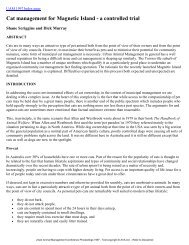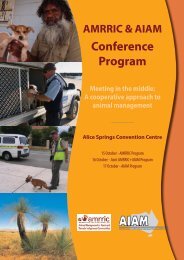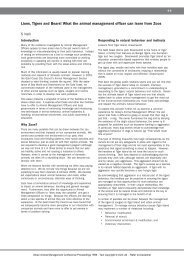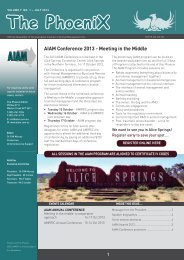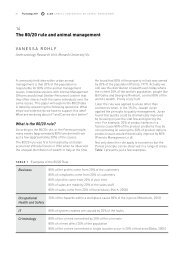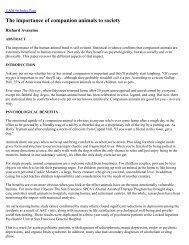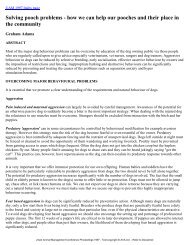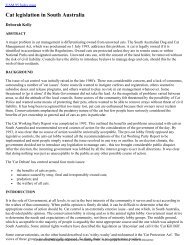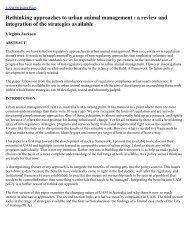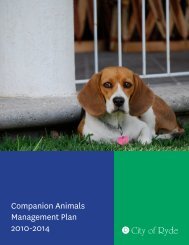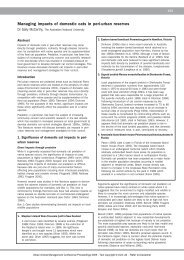Proceedings OF ThE - Australian Institute of Animal Management Inc
Proceedings OF ThE - Australian Institute of Animal Management Inc
Proceedings OF ThE - Australian Institute of Animal Management Inc
You also want an ePaper? Increase the reach of your titles
YUMPU automatically turns print PDFs into web optimized ePapers that Google loves.
Annual Conference on <strong>Animal</strong> <strong>Management</strong> AIAM <strong>Proceedings</strong> 2012 51<br />
Educating or ‘two way knowledge sharing’<br />
Education or ‘two way knowledge sharing’ is a<br />
critical component <strong>of</strong> companion animal health,<br />
welfare and control bridging knowledge gaps from<br />
both European and Indigenous cultures. All levels<br />
<strong>of</strong> government are beginning to realize the huge<br />
value in this vital program component although is<br />
still tends to fall down the list in terms <strong>of</strong> budgetary<br />
priorities. There is currently a lack <strong>of</strong> trained<br />
Aboriginal staff in the NT who can deliver the<br />
programs and a paucity <strong>of</strong> resources on the whole,<br />
especially for remote communities. AMRRIC is<br />
redressing this through the employment and training<br />
<strong>of</strong> up to 18 <strong>Animal</strong> <strong>Management</strong> Worker’s over the<br />
next few years. Through education and advocacy,<br />
appropriate resourcing and two-way knowledge<br />
transfer we are able to create the resources the<br />
community requires to establish a plan to achieve<br />
animal health and welfare standards that everyone<br />
can be proud <strong>of</strong>.<br />
For the majority <strong>of</strong> Aboriginal people in remote<br />
communities English is their third or fourth language<br />
and English literacy rates are poor (Donelan 2006).<br />
We must bear this in mind when communicating<br />
messages from our world perspective. An imposed<br />
western world view, as so <strong>of</strong>ten seen, becomes<br />
the single most important factor in accounting for<br />
communication breakdown (<strong>Australian</strong> Volunteers<br />
International 2004). Communities must be<br />
empowered with knowledge, through community<br />
engagement and consultation to understand by laws,<br />
animal health and welfare messages etc. through<br />
appropriate messaging, images, and language<br />
if change is to come about. <strong>Animal</strong> management<br />
workers or local rangers are the expert<br />
communicators in delivering the right messages<br />
(Constable et al 2010).<br />
Through community engagement and consultation,<br />
correct language and the messages to be conveyed<br />
can be checked, or better yet, developed as tailor<br />
made resources for their community. External<br />
visitors or workers may speak about removing<br />
people’s ‘neglected animals’ and finding them ‘new<br />
and better homes’ which can create painful parallels<br />
with the stolen generations story, demonstrating the<br />
importance <strong>of</strong> ‘right’ language and understanding<br />
the environment they are in.<br />
It has been demonstrated that trained animal<br />
management workers are best placed to raise<br />
awareness and improvements <strong>of</strong> dog health issues<br />
through locally delivered education strategies. Verbal<br />
‘yarning’ is demonstrated to be the preferred method<br />
<strong>of</strong> knowledge sharing for 68.4% <strong>of</strong> those interviewed<br />
by Constable et al 2010, and 79% <strong>of</strong> the people<br />
preferred locally produced education resources over<br />
commercial resources that had no real meaning<br />
for them (Constable et al 2010). However, every<br />
community differs in their preferred way <strong>of</strong> sharing<br />
knowledge: some prefer passive pictorial resources<br />
and others preferred active participative dog health<br />
demonstration days or watching an educational<br />
video. Clearly people need to receive messages<br />
delivered in a relevant and culturally appropriate<br />
manner, to best encourage communication and to<br />
avoid forming barriers through misunderstandings.<br />
Prendergast’s (Prendergast et al. 2008) research<br />
demonstrated that family members play a key role<br />
in shaping dog ownership behaviors and decisions<br />
concerning participating in education and dog health<br />
and desexing programs. A recent evaluation <strong>of</strong> the<br />
AMRRIC’s DVD, ‘Caring for Dogs, Community and<br />
Country’, undertaken by an independent consultant,<br />
showed that learning about caring for dogs occurred<br />
through organised and structured activities (active<br />
learning) and through more informal mechanisms,<br />
such as the DVD playing in the background in waiting<br />
rooms (passive learning). Engaging families in this<br />
type <strong>of</strong> learning was demonstrated as essential to<br />
attaining desired behavioural changes (Holmes 2012).<br />
Further, developing an understanding <strong>of</strong> relevant<br />
legislative requirements through targeted education<br />
and training programs will enhance the capacity <strong>of</strong><br />
communities to benefit from the implementation <strong>of</strong><br />
programs. Enabling communities to understand the<br />
process fosters effective and appropriate long term<br />
change and compliance. Likewise, enabling service<br />
providers and other stakeholders to understand<br />
better the environment they are working in allows<br />
them to appreciate the kinds <strong>of</strong> barriers that impede<br />
immediate term change in essential areas <strong>of</strong> animal<br />
welfare and management.<br />
Giving it time – ‘slow and steady’<br />
Government funding is generally tied to Key<br />
Performance Indicators (KPI’s). For service providers<br />
who are funded dependent on the achievement <strong>of</strong> set<br />
KPI’s, challenges arise when remote communities<br />
do not function on this western view basis. Given<br />
the range <strong>of</strong> cultural and sociological attitudes<br />
toward pets, the difference in world view, significant<br />
imposed government policies constantly reshaping<br />
community living and a range <strong>of</strong> other external<br />
influences on community, pets are <strong>of</strong>ten way down<br />
the scale <strong>of</strong> importance when it comes to coping<br />
with this high level <strong>of</strong> change. Pets and program<br />
outcomes don’t <strong>of</strong>ten meet the KPI’s organisations<br />
need to report on. Programs may take enormous<br />
amounts <strong>of</strong> time which can seem frustrating to<br />
local government and service providers. It has been<br />
demonstrated to AMRRIC, program after program,<br />
that ‘slow and steady wins the race’. There are no<br />
‘quick fix solutions’ despite millions <strong>of</strong> dollars that<br />
have been spent in the past trying to achieve one.



